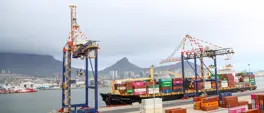Durban-Gauteng Freight Corridor: DoT needs commercial 'reality check' if rail plan to succeed - Port of Gauteng
Paula Luckhoff
28 October 2025 | 18:47The fact that rail currently moves less than 14% of volumes compared to the Corridor highway is a huge problem, says PoG developer Francois Nortjé.
- The Money Show
- Stephen Grootes
- Rail infrastructure
- Gauteng
- Department of Transport
- Gauteng Department of Transport
- Transnet

Truck, road freight transport. Pexels/Artem Balashevsky
The Durban–Gauteng Freight Corridor is an important route in South Africa's freight transport landscape, but its road constituent is coming under increasing pressure, warns the Port of Gauteng project.
Since the 2013 National Development Plan set ambitious 2030 targets for shifting freight from road to rail, little progress has been made, notes Port of Gauteng developer Francois Nortjé.
With only four years remaining, high transport costs and poor freight infrastructure are preventing South Africa from meeting its targets, he says.
The White Paper released by the Port of Gauteng, the proposed inland logistics hub, identifies areas where the Department of Transport needs 'a reality check'.
This trade gateway is described as one of SA's largest private sector initiatives, 'strategically positioned at the junction of the Container Rail Corridor and the N3, N12, and N17 highways'.
However, it faces a mounting crisis, whererail currently moves less than 14% of volumes, says Nortjé.
To succeed, according to the White Paper, the country urgently requires:
• A decisive shift from road to rail to meet the envisioned 50% modal split, by addressing rail’s lack of intermodal flexibility.
• A reduction in truck traffic on the N3 by roughly one-third (volumes undisclosed by N3TC/SANRAL).
• A reduction in logistics costs without the need for unsustainable government subsidies for rail.
Aside from addressing the huge losses incurred by Transnet every year on the Corridor, Nortjé emphasizes the need to rein in 'unscrupulous' transport operators on the route.
"A train can compete with a truck to Cape Town and to Gqeberha, but it's very easy for the trucks to compete between Durban and Gauteng. At 550 km it's 25% less distance to travel than the rail line and that highway runs so nicely - it's straightened and shortened, and that is part of the problem."
"Then there's also the factor of unscrupulous operators on that route - people that don't necessarily maintain their trucks, the people that don't belong to the bargaining council... and that makes the pricing on trucking very competitive."
Scroll up to the audio player to listen to Nortjé's argument
Get the whole picture 💡
Take a look at the topic timeline for all related articles.
Trending News
More in The Money Show

3 February 2026 20:28
Top TikTok influencer's actual worth questioned after R14bn deal

3 February 2026 20:05
SA hospitality industry threatened by deepening human capital crisis - new hoteliers report

3 February 2026 19:08
Fruit industry loses R350m over Cape Town Port failures, weighs legal action against Transnet














